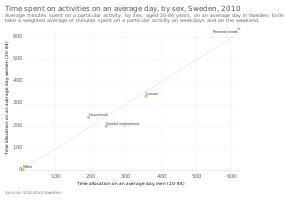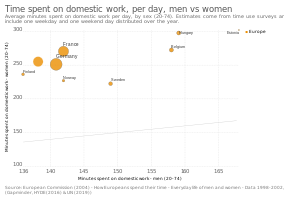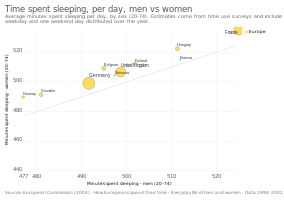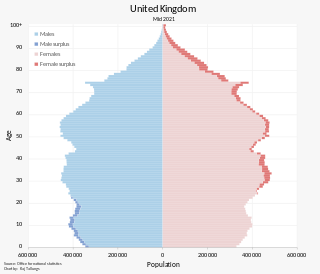
The population of the United Kingdom was estimated at over 67.0 million in 2020. It is the 21st most populated country in the world and has a population density of 270 people per square kilometre, with England having significantly greater density than Wales, Scotland, and Northern Ireland. Almost a third of the population lives in south east England, which is predominantly urban and suburban, with about 9 million in the capital city, London, whose population density is just over 5,200 per square kilometre.
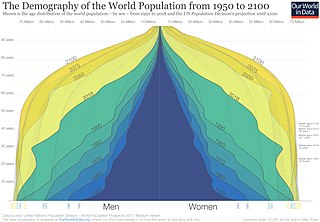
Demography is the statistical study of human populations: their size, composition, and how they change through the interplay of fertility (births), mortality (deaths), and migration.

Feminist economics is the critical study of economics and economies, with a focus on gender-aware and inclusive economic inquiry and policy analysis. Feminist economic researchers include academics, activists, policy theorists, and practitioners. Much feminist economic research focuses on topics that have been neglected in the field, such as care work, intimate partner violence, or on economic theories which could be improved through better incorporation of gendered effects and interactions, such as between paid and unpaid sectors of economies. Other feminist scholars have engaged in new forms of data collection and measurement such as the Gender Empowerment Measure (GEM), and more gender-aware theories such as the capabilities approach. Feminist economics is oriented towards the goal of "enhancing the well-being of children, women, and men in local, national, and transnational communities."
Statistics Canada, formed in 1971, is the agency of the Government of Canada commissioned with producing statistics to help better understand Canada, its population, resources, economy, society, and culture. It is headquartered in Ottawa.
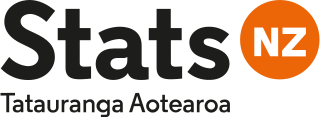
Statistics New Zealand, branded as Stats NZ, is the public service department of New Zealand charged with the collection of statistics related to the economy, population and society of New Zealand. To this end, Stats NZ produces censuses and surveys.

In macroeconomics, the labor force is the sum of those either working or looking for work :
The System of National Accounts is an international standard system of national accounts, the first international standard being published in 1953. Handbooks have been released for the 1968 revision, the 1993 revision, and the 2008 revision. The System of National Accounts, in its various released versions, frequently with significant local adaptations, has been adopted by many nations. It continues to evolve and is maintained by the United Nations, the International Monetary Fund, the World Bank, the Organisation for Economic Co-operation and Development, and Eurostat.
A career break is a period of time out from employment. It is commonly used for people to take time out of their career for personal or professional development.

Rushton is a village and civil parish in the unitary authority of Cheshire West and Chester and the ceremonial county of Cheshire, in the north west of England, approximately 6 miles (10 km) west of Winsford and 2 miles (3 km) north east of Tarporley. According to the 2011 census, Rushton has 484 people. Rushton is predominantly countryside, however does includes the village of Eaton. This village contains the Jessie Hughes Village Hall, Eaton Primary School and the church of St Thomas.

The Organisation for Economic Co-operation and Development defines the employment rate as the employment-to-population ratio. This is a statistical ratio that measures the proportion of a country's working age population that is employed. This includes people that have stopped looking for work. The International Labour Organization states that a person is considered employed if they have worked at least 1 hour in "gainful" employment in the most recent week.
Health in the United Kingdom refers to the overall health of the population of the United Kingdom. This includes overall trends such as life expectancy and mortality rates, mental health of the population and the suicide rate, smoking rates, alcohol consumption, prevalence of diseases within the population and obesity in the United Kingdom. Three of these – smoking rates, alcohol consumption and obesity – were above the OECD average in 2015.

Since 1922, the United Kingdom has been made up of four countries: England, Scotland, Wales and Northern Ireland. The UK Prime Minister's website has used the phrase "countries within a country" to describe the United Kingdom. Some statistical summaries, such as those for the twelve NUTS 1 regions of the UK, refer to Northern Ireland, Scotland, and Wales as "regions". With regard to Northern Ireland, Scotland and Wales particularly, the descriptive name one uses "can be controversial, with the choice often revealing one's political preferences".
Michael Ward was a British economist and statistician who contributed significantly to the evolution of the international statistical system in the post-war period.
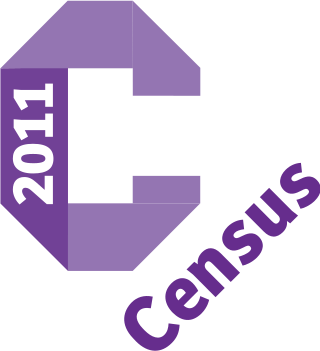
A census of the population of the United Kingdom is taken every ten years. The 2011 census was held in all counties of the UK on 27 March 2011. It was the first UK census which could be completed online via the Internet. The Office for National Statistics (ONS) is responsible for the census in England and Wales, the General Register Office for Scotland (GROS) is responsible for the census in Scotland, and the Northern Ireland Statistics and Research Agency (NISRA) is responsible for the census in Northern Ireland.

Unpaid labor or unpaid work is defined as labor or work that does not receive any direct remuneration. This is a form of non-market work which can fall into one of two categories: (1) unpaid work that is placed within the production boundary of the System of National Accounts (SNA), such as gross domestic product (GDP); and (2) unpaid work that falls outside of the production boundary, such as domestic labor that occurs inside households for their consumption. Unpaid labor is visible in many forms and isn't limited to activities within a household. Other types of unpaid labor activities include volunteering as a form of charity work and interning as a form of unpaid employment. In a lot of countries, unpaid domestic work in the household is typically performed by women, due to gender inequality and gender norms, which can result in high-stress levels in Women attempting to balance unpaid work and paid employment. In poorer countries, this work is sometimes performed by children.
Work intensity is defined as activity in relation to the capacity for that work. It is a topic that affects developed and developing countries in different ways. There are many aspects to work intensity including multitasking, time poverty, health implications, and policy considerations. Multitasking is the overlap of many activities, usually care and informal work, that negatively impacts the livelihood of people, especially women, in the developing world. Time poverty is defined as the lack of time for leisure and rest activities after time spent working. High work intensity coupled with multitasking and time poverty has a negative correlation with health outcomes. Work intensity is seldom considered when proposing new policy and legislation. As more women enter the workforce, work intensity and its implications are being brought to the forefront of policy, development, and empowerment debates.

Unemployment in the United Kingdom is measured by the Office for National Statistics.

The Gender Inequality Index (GII) is an index for the measurement of gender disparity that was introduced in the 2010 Human Development Report 20th anniversary edition by the United Nations Development Programme (UNDP). According to the UNDP, this index is a composite measure to quantify the loss of achievement within a country due to gender inequality. It uses three dimensions to measure opportunity cost: reproductive health, empowerment, and labor market participation. The new index was introduced as an experimental measure to remedy the shortcomings of the previous indicators, the Gender Development Index (GDI) and the Gender Empowerment Measure (GEM), both of which were introduced in the 1995 Human Development Report.
Cornwall is a unitary authority and ceremonial county of England in the United Kingdom. At the 2011 census it had a population of 532,000. Cornwall is the homeland of the Cornish people, and many within Cornwall identify with a Cornish ethnic or national identity, although, due to Cornwall's political status as part of England and the United Kingdom, as well as in-migration from other parts of the UK and EU, additional identities such as English, British, and European may also be adopted.
Multiple sex partners is the measure and incidence of engaging in sexual activities with two or more people within a specific time period. Sexual activity with MSP can happen simultaneously or serially. MSP includes sexual activity between people of a different gender or the same gender. A person can be said to have multiple sex partners, when the person have sex with more than one person at the same time. Another term, polyamorous, is a behavior and not a measure describing multiple romantically sexually or romantically committed relationships at the same time.
